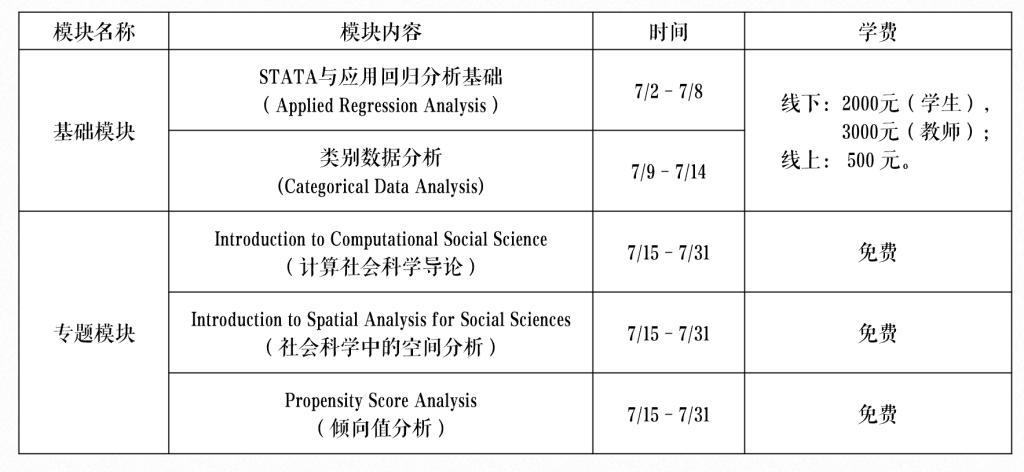第10届·应用社会科学研究方法研修班 简章
(暑期班·2021·上海)
时间:2021年7月2日 – 7月31日
主办: 上海大学社会学院
上海纽约大学应用社会经济研究中心
协办:上海大学数据科学与都市研究中心
上海大学上海社会科学调查中心
为推动中国社会学定量研究方法的教学,加快培养应用社会科学研究的人才,促进教学和研究资源的地区均衡分布,上海大学社会学院与香港科技大学应用社会经济研究中心自2012年夏季开始, 联合举办《应用社会科学研究方法研修班》,至今已经成功举办9届17期“暑期班”与“冬季班”,参训学员超5000人次, 来自全国各个省份以及欧美的300多所高校与科研机构。
2021年暑期,上海大学社会学院与新成立的上海纽约大学应用社会经济研究中心将在上海继续举办《第10届·应用社会科学研究方法研修班·暑期班》,邀请南京大学社会学院吴愈晓教授、澳门大学社会学副教授蔡天骥博士、美国圣路易斯华盛顿大学社会工作学院郭申阳教授、美国内华达大学公共卫生学院林戈教授、依阿华大学社会学系助理教授施永仁博士等学有专长的学者讲授,更加突出“研修班”的跨学科、国际化、多层次和实用性的特色。
(1)2021年暑期班继续秉持“基础模块”+“专题模块”的课程模式,内容化整为零,前后衔接一体,学员可根据自己的实际情况自由选择不同模块。
(2)2021年暑期班继续秉持方法教学与实际应用相结合的宗旨,教学与答疑相结合。
(3)2021年暑期班继续注重培养学员对社会科学研究方法的深入理解,对统计技术和数据处理的操作,和结合社会科学研究的应用能力。
由于受新冠疫情的持续影响,主办方经反复权衡,决定继续举办第10届应用社会科学研究方法研修班。“基础模块”为线下和线上混合模块,由上海大学数据科学与都市研究中心负责。“专题模块”改为英文线上讲授,由上海纽约大学应用社会经济研究中心负责。我们热诚欢迎国内外各地区高等院校、科研院所的青年教师、研究生和高年级本科生报名参加!
为庆祝暑期班成功举办10周年,主办方将组织一系列学术活动 (将稍后发布)。
一、课程安排

(一)基础模块
时间:2021年7月2号-7月14号
地点:上海大学宝山校区(或线上视频直播)
模块教学内容:
《STATA与应用回归分析基础》[课程编号501](南京大学吴愈晓)
《类别数据分析》[课程编号503](澳门大学蔡天骥)
招生人数:
60人(线下)、300人(线上);
基础模块以高年级本科生与研究生为主,兼顾青年教师;
修过相关统计课程及熟悉STATA操作者优先。
基础模块学费:
线下学费: 2000元(学生),3000元(教师、科研人员等)
*注:线下学员将同时拥有线上学习权限。
线上学费: 500 元
[1.1]《STATA与应用回归分析基础》[课程编号501]
主讲教师:吴愈晓教授
时间:2021年7月2日- 7月8日
课时:42学时,上午3小时课程,下午3小时上机答疑,共7天。中文授课。
课程介绍:
本课程侧重于从应用与操作的角度介绍多元线性回归分析技术,内容涵盖函数与变量形式、统计检验与回归诊断等。课程首先将介绍简单线形回归的主要假设、估计方法与特性,进而推及多元回归模型并解释后者的优势与必要性。本课程只考虑因变量为连续或两分变量的情形。课程将重点讨论各种形式的自变量,如虚拟变量、连续变量的对数形式、二次项以及自变量之间的相互作用,并阐述如何解释相关的回归系数。接下来,课程将介绍系数与系数线形组合的显著性检验以及对模型拟合优度的测量。课程的最后将介绍针对奇异值、多重共线性与异方差性等问题的回归诊断技术。在对以上所有主题的讨论中,本课程将着重于其在实际分析中的意义及如何运用统计软件加以实现,仅在必要时给予数学证明或统计理论上的解释。
教师简介:
吴愈晓教授本科和硕士分别毕业于中国人民大学和北京大学社会学系,2006年获美国西北大学(Northwestern University)社会学博士学位。2006年7月至2008年7月担任香港科技大学社会科学部博士后研究员,2008-2013年在山东大学哲学与社会发展学院工作。现任南京大学社会学系教授,博士生导师。他的主要研究领域为社会分层与流动、教育社会学、职业与劳动力市场和定量研究方法等。在《中国社会科学》、《社会学研究》、《社会》, Sociological Perspectives,等中英文杂志发表论文多篇。主要讲授“社会统计学与定量数据分析”、“社会分层与流动”等课程。2011年入选教育部“新世纪优秀人才支持计划”,2014年入选南京大学“登峰人才支持计划”,2016年入选教育部“青年长江学者”。
[1.2]《类别数据分析》[课程编号503]
主讲教师:蔡天骥(Tianji CAI)教授
课程时间:2021年7月9日-7月13日
课时:30学时,上午3小时课程,下午3小时上机答疑,共5天。中文授课。
课程介绍:
类别变量回归模型作为线性回归模型的延伸, 包括对二分变量 (dichotomous variable), 定序变量 (ordinal variable) , 多项变量 (multinomial variable) 以及频次 (count) 的回归分析。在对基本概念和模型估计简介之后,本课程主要集中在模型构建与解释, 以及如何应对在社会科学运用中常见的问题。
作为线性回归的延伸, 本课程要求学员对线性回归的基本假设、解释、以及模型构建有基本了解,同时对基本数学符号及运算法则(比如对数运算)有所了解。
本课程将使用STATA作为模型估计工具。
教师简介:
蔡天骥,现任澳门大学社会学系副教授。蔡博士2001年本科毕业于获兰州大学社会学系,2004年获北京大学人口学硕士学位,2006、2010年分别获University of North Carolina, Chapel Hill社会学硕士、博士学位。2010-2012年任北得克萨斯大学社会学系助理教授。蔡博士的研究方向包括定量分析方法与应用,数据挖掘,基因与社会环境交互, 以及社会网络分析。他的文章发表于American Sociological Review,American Journal of Sociology,Chinese Sociological Review,Sociological Methodology,Sociological Methods and Research,Social Science Research,Demography,PLoS ONE等。
(二)专题模块
[2.1]Introduction to Computational Social Science[课程编号522A]
主讲教师:Yongren Shi(施永仁)教授
工作语言:英文
时间:2021年7月15号-7月31号
地点:线上
课时:每天下午3.5小时课程,共5讲。
学费:免费
招生人数:25人
The technological revolution in mobile and Internet communications has transformed how we interact and how the society functions. It poses new opportunities but also challenges to social scientists who may not have adequate training in collecting, cleaning, and analyzing large-scale unstructured data. This course aims to 1) offer a survey of methods and techniques commonly used in computational social science, and 2) introduce a pipeline of doing computational social science, starting with data collection and data wrangling, theorizing and asking questions, measuring unmeasurables, followed by useful analytical strategies and result presentation. The topics that will be covered in the course include basics in machine learning, network science, textual analysis, webscraping and APIs, explorative data analysis, and big data ethics. The programming language used in the course is Python (Students who are proficient in the R programming language are also encouraged to apply).
Prerequisites:
Basic programming skills in Python or R.
Intro statistics and linear regression models.
About the Instructor:Yongren Shi (Assistant Professor of Sociology, The University of Iowa) is a computational sociologist who specializes in analyzing large-scale digital traces of online human behavior. The foundation of his research is the sociological study of human behavior and group dynamics. Specifically, he is working on the social and cultural processes of opinion formation, differentiation and polarization, and the evolution and ecology of social groups. His research has appeared in leading social science journals such as the American Sociological Review, American Journal of Sociology, Nature Human Behaviour, Social Forces, and Sociological Methods & Research, among others. His research has been supported by grants from the National Science Foundation and covered by dozens of popular media outlets including Wired, the Guardian, BBC News, Huffington Post, and the LA Times.
[2.2]Introduction to Spatial Analysis for Social Sciences[课程编号512]
主讲教师:Ge Lin Kan(林戈)教授
工作语言:英文
时间:2021年7月15号-7月31号
地点: 线上
课时:每天下午3.5小时课程,共5讲。
学费:免费
招生人数:25人
Course Description
Advances in geo-computation and explosion of geo-referenced data have pushed the geographic information system (GIS) and spatial analysis to the forefront of knowledge discoveries in social sciences. This course introduces basic GIS concepts, spatial data processing, and exploratory data analysis. Each lecture is organized by introducing (a) concepts and measurements, (2) social science applications, and hands-on labs using QGIS (optionally GeoDa). Students are encouraged to bring their own data and research questions to the lecture to have a live discussion or research in action.
About the Instructor:Dr. Ge Lin Kan is a professor of epidemiology in the School of Public Health, University of Nevada, Las Vegas. He received his BS. MA and Ph.D degrees (all in geography) from Peking University, University of Akron, and the State University of New York at Buffalo. He was trained in spatial demography and GIS. He is known for his works in spatial modeling, spatial statistics for count data, and spatial disparities in health. His most recent research focuses on the public health data science. He uses the infrastructure approach to develop integrated data marts, data analysis utilities, and training modules for public health data specialists. His research has been supported by NIH, NIJ, NSF and the Nebraska Department of Health and Human Services. His book Smart use of state public health data for health disparity assessments was published 2016 by CRC Press.
[2.3]Propensity Score Analysis[课程编号509]
主讲教师:Shenyang Guo(郭申阳)教授
工作语言:英文
时间:2021年7月15号-7月31号
地点: 线上
课时:每天下午3.5小时课程,共6讲。
学费:免费
招生人数:25人
Course Description
Propensity score analysis is a relatively new and innovative class of statistical methods that has proven useful for evaluating the effects of treatments or interventions when using nonexperimental or observational data.
Although regression analysis is most often used to adjust for potentially confounding variables, propensity score analysis is an attractive alternative. Results produced by propensity score methods are typically easier to communicate to lay audiences. And propensity score estimates are often more robust to differences in the distributions of the confounding variables across the groups being compared.
This seminar will focus on four closely related but technically distinct propensity score methods:
• Propensity score matching and related methods, including greedy matching, optimal matching, and propensity score weighting using Stata psmatch2, pweights and R optmatch
• Matching estimators using Stata nnmatch
• Propensity score analysis with nonparametric regression using Stata psmatch2 and lowess
• Instrumental variable approach, Heckman’s sample selection model.
The examination of these methods will be guided by two conceptual frameworks: the Neyman-Rubin counterfactual framework and the Heckman scientific model of causality. The course also covers Rosenbaum’s approaches of sensitivity analysis to discern bias produced by hidden selections.
The seminar uses Stata software to demonstrate the implementation of propensity score analysis. Although participants will not do hands-on work during the seminar, they are encouraged to practice on their own time. All syntax files and illustrative data can be downloaded at the Propensity Score Analysis support site https://ssw.unc.edu/psa.
About the Instructor:Shenyang Guo, Ph.D., is Frank J Bruno Distinguished Professor at Brown School of Washington University in St Louis, and the fellow of American Academy of Social Work and Social Welfare. He is an expert on the application of advanced statistical models to the solution of social welfare problems. Guo is the author (with Mark Fraser) of Propensity Score Analysis: Statistical Methods and Applications, Second Edition (2015), a comprehensive guide to the many ways that propensity scores can be used to improve causal inference. Other books include Survival Analysis (2010) and Structural Equation Modeling (2011) (with Natasha Bowen). He has published more than 80 journal articles and book chapters. He is on the editorial boards of Social Service Review, Journal of the Society for Social Work and Research, and Children and Youth Services Review. He teaches graduate courses on survival analysis, hierarchical linear modeling, growth curve modeling, structural equation modeling, and propensity score analysis.
更多专题班信息请访问:上海纽约大学应用社会经济研究中心https://caser.shanghai.nyu.edu/
二、申请程序
1. 申请原则:
(1) 2021年暑期班 “基础模块”由2门课程组成,采取“模块报名”的申请方式,2门基础课程不能分别单独申请。
(2) “专题模块”由3 门课程组成,采取“课程报名”的申请方式,3门专题课程可以分别单独申请,最多不能超过两门。
(3) 原则上不鼓励学员同时申请“基础课程”与“专题课程”;
2. 申请日期:2021年4月13日-5月31日。
3. 申请方式:
在线提交报名申请(扫描二维码提交申请)。


基础模块扫码报名https://wj.qq.com/s2/8288402/5774/

专题模块扫码报名https://nyu.qualtrics.com/jfe/form/SV_410E1RZQD5EaLFc
注意:由于基础模块和专题模块所需要的申请材料有差异,请分开申请。
2021年6月4日前审核报名材料并尽快通知录取结果,录取结果将于6月8号在上海大学社会学院(https://sociology.shu.edu.cn/)、上海大学数据科学与都市研究中心(https://suns.shu.edu.cn/)以及魔都有调研微信公众号公布。录取通知及缴费方式将同时发送至报名邮箱。若没有收到录取结果,可来电或者发邮件至shuworkshop2021@126.com咨询。
4.学员收到录取通知(电子邮件)后,发送《回执》或缴费证明给主办方;主办方将通过电邮发送相关材料和指引。
5. 咨询方式:
电话
021-66136195(上海大学 陈老师) (基础班)
021-20595669(上海纽约大学 刘老师)(专题班)
咨询邮箱:
shuworkshop2021@126.com (基础班)
shanghai.caser@nyu.edu (专题班)
官方网站:
上海大学社会学院:https://sociology.shu.edu.cn/
上海大学数据科学与都市研究中心:https://suns.shu.edu.cn/
上海纽约大学应用社会经济研究中心:https://caser.shanghai.nyu.edu/
6. 确保所提供的联系方式(电话和电子邮箱)能及时联系到申请者本人。如所提供的电话和电子邮箱有变,请及时告知,以免由此导致相关信息资料不能正常送达。
三、课程考核
1. 凡参加暑期课程的学员,完成必须的作业;
2. 完成课程培训,颁发《结业证书》。
四、“应用社会科学方法”研修班课程规划大纲
基础模块课程
500.《统计软件应用:STATA》[基础课程]
501.《应用回归分析基础》[基础课程]
502.《高级应用回归分析》[基础课程]
503.《类别数据分析》[基础课程]
专题模块课程
504.《调查数据分析》
505.《对数线形模型》
506.《事件史分析》
507.《多层次线形模型》
508.《固定效应模型》
509.《因果分析模型》
510.《结构方程模型》
511.《研究设计》
512.《GIS应用与空间分析》
513.《潜类分析》
514.《网络分析》
515.《抽样调查》
516.《增长模型》
517.《因素分析》
518.《路径分析》
519.《民意调查》
520.《计算机在调查中的应用》
521.《统计软件应用:SAS》
521.《统计软件应用:R》
522.《数据挖掘》
522A.《计算社会科学入门》
522B. 《定量文本分析》
高级研讨课程
523.《数据分析专题》
524.《社会科学研究专题》
525.《社会科学定量研究论文》工作坊


